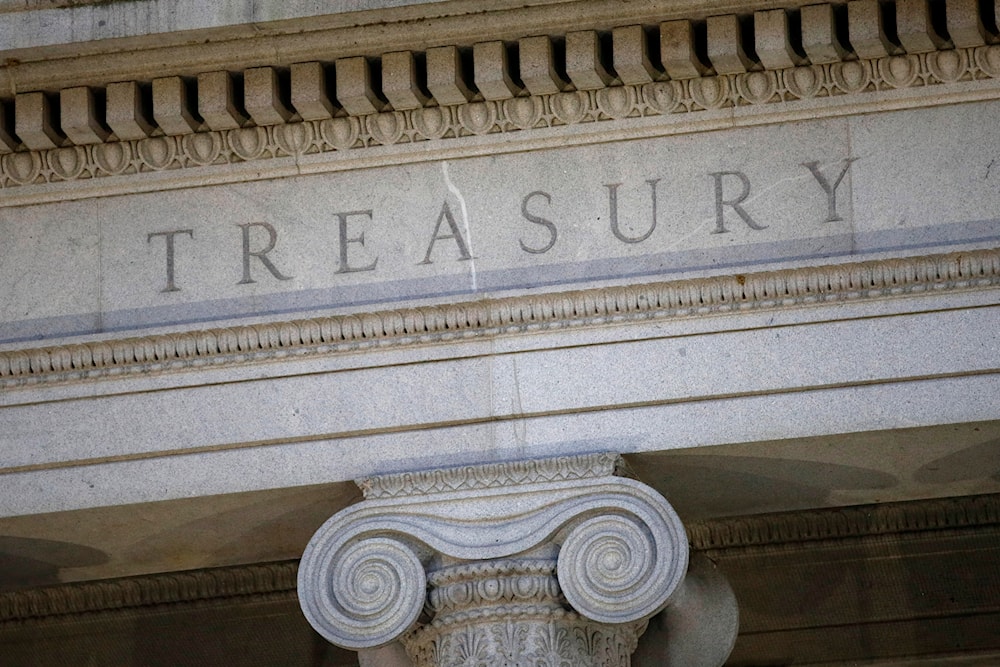Trump trade, debt policy fears trigger US bond market exodus: FT
Investors are fleeing the US bond market amid fears of Trump’s tax plan, trade war, and rising deficits, shifting capital to global debt markets.
-

This photo shows the US Treasury Department building at dusk in Washington, June 6, 2019. (AP)
Global investors are increasingly shifting away from the US bond market, citing deepening worries over Donald Trump’s fiscal policies, trade war strategies, and the ballooning federal deficit, which they say have undermined confidence in the world’s most liquid debt market.
The move comes as long-dated US government bonds continue to sell off, with yields climbing and demand weakening. Investment managers at some of the largest global firms now say they are actively reallocating away from treasuries in favor of higher-yielding, more stable markets outside the United States.
The tipping point, according to analysts, was the passage of Trump’s latest tax legislation, dubbed the “big, beautiful” tax bill, by the House of Representatives. Investors see the bill as a major contributor to an already growing deficit, with the 30-year Treasury yield spiking to over 5.1%, the highest level since 2023.
Vincent Mortier, chief investment officer at Amundi, Europe’s largest asset manager, warned that “the US is no longer the ultimate and only perceived safe haven,” citing extreme fiscal indiscipline as a growing concern for international buyers.
Investors were further rattled by Trump’s so-called “liberation day” tariffs on April 2, which triggered wild volatility in treasuries. During this period, US debt failed to act as a safe harbor from market stress, upending decades of conventional investing wisdom.
Global fund managers favor Europe, Japan, and Australia
Major fund groups, including JPMorgan Asset Management and Pimco, are now urging clients to diversify portfolios toward European, Japanese, and Australian bond markets, where yields are strengthening and economic outlooks are stabilizing.
“Our client base is feeling heavily overweight on dollar assets,” said Bob Michele, chief investment officer at JPMorgan.
“They’re concerned now about all things US, the impact of tariffs, the budget deficit, the fiscal outlook, and they’re using this moment to diversify.”
The shift marks a renewed interest in what were once considered peripheral borrowers.
Michele noted that markets like Italy and Spain are now drawing attention, even as core European economies like Germany and France face their own fiscal expansion challenges.
Dollar weakness underscores urgency of diversification
The exodus from US bonds has been mirrored by significant dollar weakness. The greenback has fallen 8% this year against a basket of major currencies, raising further alarms about the sustainability of US economic fundamentals.
“There is power in diversification outside the US,” said Lindsay Rosner, head of multisector investing at Goldman Sachs. While the US market remains uniquely liquid, she warned that dollar softness “has some permanence,” underscoring the broader risks of dollar overexposure.
Pimco, JPMorgan warn of diminishing US debt appeal
Bond fund giant Pimco confirmed it was “prudent” to search for high-quality alternatives to US treasuries. In comments to the Financial Times, its leadership highlighted recession risks linked to Trump’s tariff strategy as a compelling reason to seek more resilient global fixed-income assets.
The momentum behind this diversification is accelerating. “There’s an acceleration in interest in looking outside of US markets,” said Michele. “You’re getting a considerable amount of yield in Europe, and that’s hard to ignore.”
KKR: Traditional role of treasuries under serious threat
Private capital firm KKR echoed these concerns in a report released earlier this month. Henry McVey, head of global macro at the firm, said Trump’s April tariff announcement triggered “serious conversations” among global boards about reducing US market exposure.
“The traditional role of US government bonds may diminish due to the country’s fiscal deficit and high leverage,” he warned. During the year’s first quarter, McVey noted, the US experienced a “trifecta” of falling equities, rising rates, and a declining dollar, prompting even sovereign wealth funds to de-risk their positions.
Amundi’s Mortier added, “The US will most probably maintain a budget deficit of 6 to 7% of GDP. That is a lot by any standard, and it will result in more supply of Treasuries. Can demand follow? Yes, but many buyers will request higher yields.”

 4 Min Read
4 Min Read








